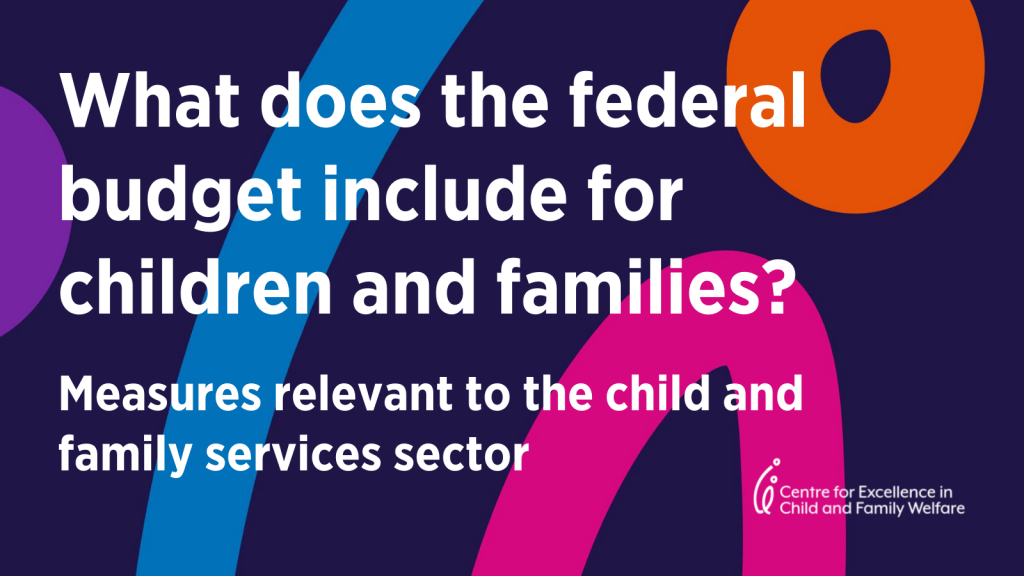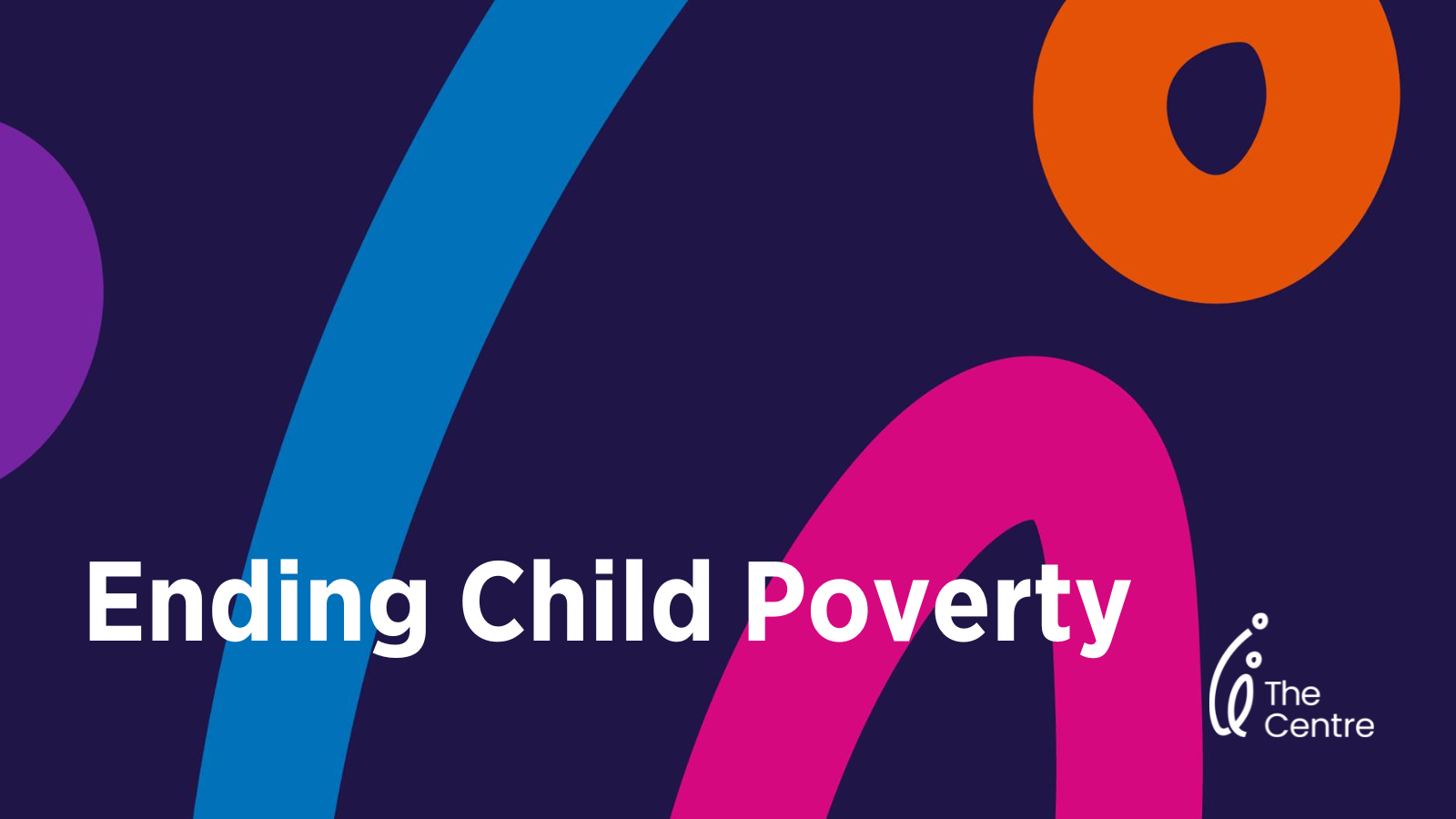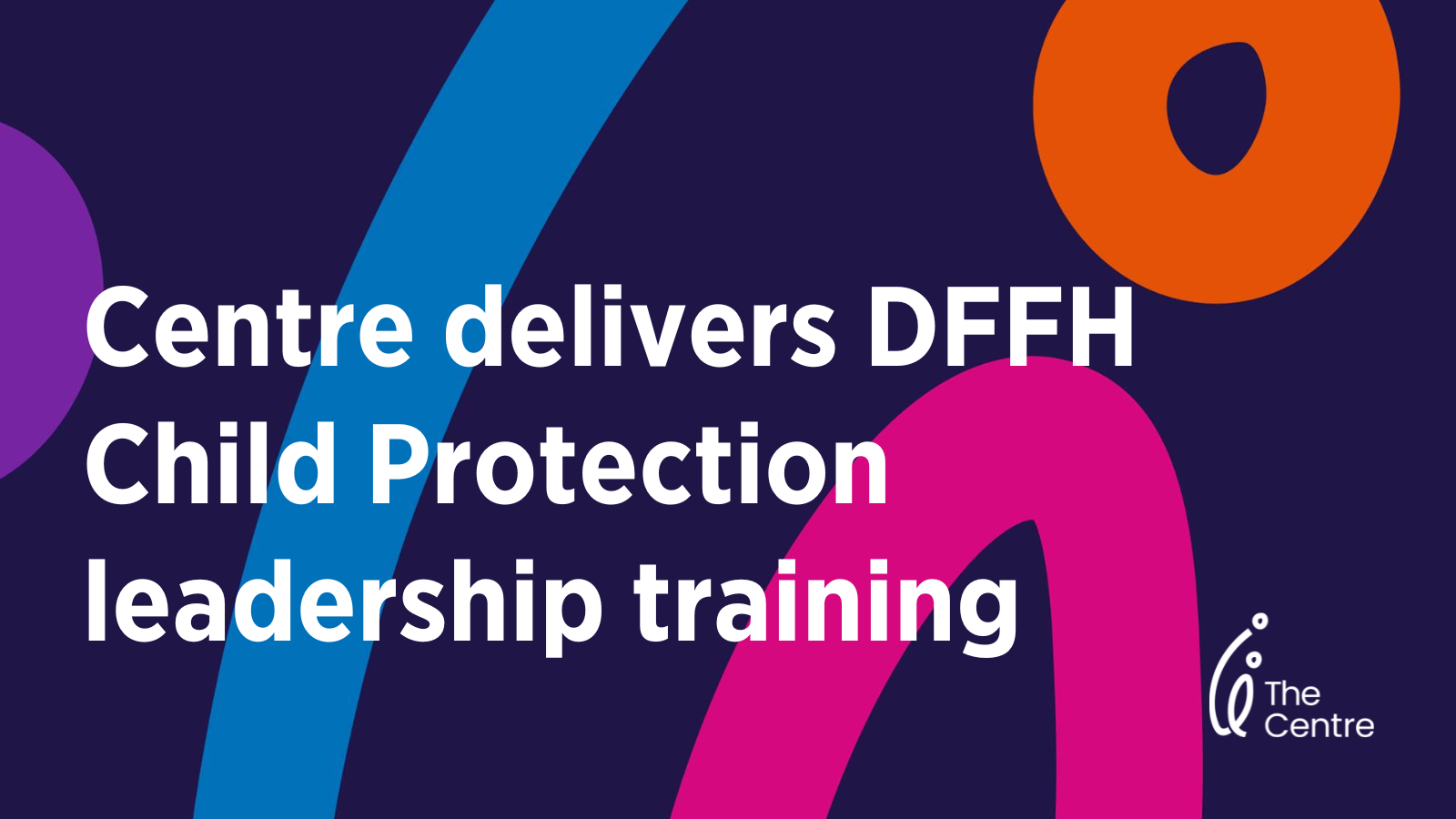Measures relevant to the child and family services sector
The Federal Budget 2022-23 was handed down on Tuesday 29 March 2022.[i] The Centre has prepared this quick overview of the budget measures that are relevant to your work in the Victorian child and family services sector and to the children, young people and families that you support.
Family violence
- Women’s Safety – $1.3 billion over 6 years from 2021-22 towards initiatives to reduce all forms of family, domestic and sexual violence (FDSV) against women and children, and to establish, enhance and expand initiatives that address the full life cycle of violence across prevention, early intervention, response and recovery. These measures will form the first phase of the Commonwealth’s contribution to the National Plan to End Violence against Women and Children 2022-2032.
- Funding of $222.6 million over 6 years from 2021-22 will be provided to strengthen initiatives to prevent gendered violence:
-
- $104.4 million from 2022-23 to continue and expand the role of the national prevention organisation Our Watch, to improve its reach in diverse communities including the LGBTIQA+ community, the disability community and those with culturally and linguistically diverse backgrounds
- $46.0 million from 2022-23 to extend the Stop it at the Start campaign, which seeks to shift community attitudes about violence among young people
- $40.1 million from 2021-22 for further initiatives aimed at the prevention of FDSV, including the continuation of existing community-led prevention activities, updating respectful relationships, education, resources to align with the new curriculum, and funding for the Australian Human Rights Commission to undertake a survey of secondary school-age students on attitudes towards consent
- $32.2 million from 2022-23 for the Commonwealth’s Consent campaign, to provide young people aged 12 years and older and their parents with materials, information and resources.
-
- Funding of $328.2 million over 5 years from 2022-23 will be provided to extend and establish programs aimed at the early intervention and prevention of FDSV:
-
- $127.8 million from 2022-23 for trauma-informed national counselling services to support victim-survivors, and extending support for the Aboriginal and Torres Strait Islander Family Support Services for families who are experiencing, witnessing or at risk of family or domestic violence, including a focus on supporting children impacted by family and domestic violence. This includes behaviour change services for individuals who have or are at risk of perpetrating gendered violence
- $54.4 million from 2022-23 for workforce development initiatives to ensure responses to FDSV are appropriate for all people and trauma-informed, including boosting funding to Lifeline to deliver nationally-accredited training for non-specialist frontline services and increasing funding for accredited sexual violence response training to health professionals
- $47.9 million from 2022-23 for an early intervention campaign aimed at boys and young men
- $41.6 million from 2022-23 for further initiatives to support early intervention, including a pilot program of trauma-informed services for mothers and children aged 6-12, additional funding for a second phase of the National Online Safety Awareness Campaign and the extension of perpetrator focused counselling and referral services
- $30.0 million from 2022-23 to build and maintain links between the National Framework for protecting Australia’s Children and the National Plan to End Violence Against Women and Their Children. These initiatives will support the implementation of both strategies to prevent and protect children from violence, abuse and neglect, including improved supports for those providing care, with a focus on supporting at risk Aboriginal and Torres Strait Islander children and young people
- $26.6 million from 2022-23 to support the eSafety Commissioner to address online abuse including establishing a team of experts to support victim-survivors of tech-facilitated abuse and expanding the Online Safety Community Grants program for community groups, sporting groups and faith communities.
-
- Funding of $480.1 million over 6 years from 2021-22 will be provided to fund programs to support women and their children who are experiencing FDSV:
-
- $240.0 million from 2023-24 to extend funding for the Escaping Violence Payment which provides financial support of up to $5,000 to women forced to leave a violent relationship
- $100.0 million from 2022-23 to extend the Safe Places program which provides emergency accommodation for women and children experiencing FDSV
- $85.4 million from 2021-22 for further initiatives to assist women and their children from diverse communities who are experiencing FDSV, extending funding for the Support for Trafficked People Program, and providing grant funding to the Northern Territory Working Women’s Centre and Working Women Queensland to support women experiencing workplace sexual harassment
- $54.6 million from 2022-23 to continue the Keeping Women Safe in their Homes and Safe Phones programs, which provide support to enable up to 30,000 women and their children to remain in their home of choice following instances of FDSV.
-
- Funding of $290.9 million over 5 years from 2022-23 will be provided to extend and expand programs that support the recovery of FDSV victim survivors:
-
- $150.5 million from 2022-23 for further initiatives to support the recovery of FDSV victim survivors, including to pilot a new model of care, to be delivered via Primary Health Networks, to improve access to trauma informed recovery services for FDSV victim survivors, funding to help people to navigate the health system, to enhance the support provided through existing Primary Health Network pilot sites and a further national expansion, and to provide funding to trial specialised and trauma informed legal services to victim survivors
- $87.9 million from 2022-23 to provide a national expansion of the Lighthouse Project, which triages FDSV matters before the family court
- $52.4 million from 2022-23 to meet expected demand for support under the Family Violence and Cross Examination of Parties Scheme.
-
- Funding of $222.6 million over 6 years from 2021-22 will be provided to strengthen initiatives to prevent gendered violence:
Cost of living
- Cost of Living Payment – $1.5 billion in 2021-22 to provide a $250 economic support payment to help eligible recipients with higher cost of living pressures. The payment will be made in April 2022 to people receiving social security payments and to concession card holders
- Addressing Cost of Living Pressures – temporary reduction in fuel excise – The Government has introduced a temporary reduction in the fuel excise from 30 March 2022 which is expected to reduce petrol prices by more than 22.1 cents per litre
- Cost of living tax offset – The Government will increase the low- and middle- income tax offset (LMITO) for the 2021-22 income year by $420. The maximum LMITO benefit in 2021-22 will be $1,500 for individuals and $3,000 for couples
- COVID-19 Response Package – tax deductibility of COVID-19 test expenses – The Government will ensure that the costs of taking a COVID-19 test to attend a place of work are tax deductible for individuals from 1 July 2021. In making these costs tax deductible, the Government will also ensure fringe benefits tax (FBT) will not be incurred by businesses where COVID-19 tests are provided to employees for this purpose.
Mental health
- Prioritising Mental Health – $547.0 million over 5 years from 2021-22 to provide mental health Stage 2 reforms through the 5 pillars of the National Mental Health and Suicide Prevention Plan. A selection of measures are included below:
- $76.4 million over 5 years from 2021-22 for prevention and early intervention activities. Funding includes:
-
-
- $52.3 million over 4 years from 2022-23 for Lifeline to provide mental health supports
- $9.7 million over 3 years from 2022-23 for nationally consistent mechanisms to better manage mental health and wellbeing concerns in schools, including a national measure of student wellbeing, national guidelines for the accreditation of mental health and wellbeing programs and trauma informed professional development support for teachers
- $3.9 million over 3 years from 2022-23 for innovative, evidence based mental health and suicide prevention research activities
- $3.3 million over 2 years from 2021-22 to fund the delivery of best-practice early intervention and prevention mentoring programs for ‘at risk’ Year 8 students at public secondary schools
- $1.8 million over 2 years from 2022-23 to continue a mental health literacy app to assist Australian parents and carers to identify the signs of social or emotional problems in children
- $1.6 million over 4 years from 2022-23 to continue funding for youth mental health services on the Mornington Peninsula.
- $206.5 million over 3 years from 2022-23 to ensure continued access to services for young Australians with severe mental illness
- $14.8 million over 5 years from 2021-22 to continue a range of headspace programs including flying headspace, the Digital Work and Study Service, and schools suicide prevention activities
- $4.2 million over 5 years from 2021-22 to support employment of general practitioners in headspace centres in rural and remote regions.
-
-
Young people
- Boosting Participation and Building Australia’s Workforce
-
- $52.8 million over 5 years from 2021-22 to deliver the new ReBoot initiative and support Workforce Australia to support up to 5,000 disadvantaged young Australians to develop employability skills, providing a pathway to employment services and training opportunities
-
- Humanitarian Program 2022-23 and Update on Afghan Arrivals
- $9.2 million in 2022-23 to extend existing Youth Transition Support services for 12 months to 30 June 2023, to continue the provision of services to young humanitarian entrants and vulnerable migrants to increase engagement in education and community sport and assist in transition to employment.
Employment for parents
- Women’s Economic Security Package – $346.1 million over 5 years from 2021-22 to improve economic security for women by enhancing the Paid Parental Leave scheme by rolling Dad and Partner Pay into Parental Leave Pay to create a single scheme of up to 20 weeks, fully flexible and shareable for eligible working parents as they see fit. The Paid Parental Leave can be taken any time within 2 years of the birth or adoption of their child. The income test will also be broadened to have an additional household income eligibility test
- Women’s Leadership Package – $1.4 million over 3 years from 2022-23 to UNICEF Australia and Parents at Work to expand the Family Friendly Workplaces initiative to a further 500 workplaces across Australia.
Early childhood education and care
- Supporting Regionalisation – $19.4 million over 5 years from 2021-22 to establish a new open grant round of the Community Child Care Fund to support the establishment of new child care services in rural, remote and regional areas where there is limited supply of current child care services.
Education
- School Education Support
-
- $7.2 million over 4 years from 2021-22 for a range of integrated measures to support teachers and school leaders to lift student performance, address disruptive behaviour and improve student engagement
- $6.1 million over 5 years from 2022-23 to provide Life Education Australia with funding to develop additional education modules on online safety, mental health, and wellbeing and respectful relationships.
-
Disability
- Support for People with Disability – $1.2 million in 2022-23 to support Amaze Incorporated and Autism Awareness Australia in expanding the existing ‘Autism: What Next?’ website to provide resources to help individuals and families navigate the first year following an autism diagnosis.
Legal support
- Attorney-General’s Portfolio – additional resourcing
-
- $16.5 million over 2 years from 2021-22 to support legal aid commissions to meet the cost of legal representation, including independent children lawyers as ordered by the Federal Circuit and Family Court of Australia as part of the Government’s enhanced case management arrangements for family law proceedings.
-
[i] Content in this quick guide is largely included verbatim from Budget Paper no. 2.
Commonwealth of Australia 2022, Budget measures – Budget paper no. 2 2022-23, Australian Government, Canberra.






